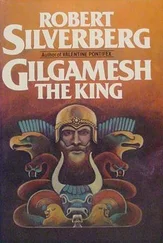And she gestured toward the rocky crevices of the far wall, where the snarling shrieking savages who threw the rocks had fled.
“Yes,” Traiben murmured. “Of course.”
I glanced at him. He sat transfixed, fascinated, his great saucer eyes wide and staring. He seemed scarcely to be breathing.
“Can it be so?” I asked him. “Can the gods have turned into—into—”
Traiben waved me irritably into silence, and pointed toward the golden-haired Irtiman, who was speaking again.
“The Pilgrimages continued,” she said, “although now there was nothing for your people to learn from ours. It had become the custom to ascend the mountain, and the custom was so powerful that it could not be halted. But those who reached the Summit—and it was always only a few who made it all the way—were horrified at what they saw. Many of them chose not to return to their villages in the lowlands, because they were unwilling or afraid to reveal the truth. These settled along the slopes of Kosa Saag: this was the beginning of the Kingdoms of the Wall. The change-forces began to affect them as they had affected us. Other Pilgrims did go to their homes again, but they came back stunned into silence or madness by their experience.”
I looked around at my companions. The truth had come rolling in upon them like a boulder. Hendy was weeping; Thissa, very pale, stared off into remote distances; Naxa the Scribe and Ijo the Scholar, sitting side by side, had their mouths gaping open loosely as though they had been struck on the head by clubs. Of the others, some were wide-eyed with indignation and disbelief, some were trembling, some looked numb. Even stolid Kilarion was frowning and muttering and peering into the palms of his outstretched hands as though he hoped to find some sort of consolation in them.
Only Thrance seemed unshaken by what he had heard. He was sprawled out comfortably on the ground as if we were simply gathered around to hear a performance by a Singer or a Musician; and he was grinning. Grinning!
The Irtiman said, “The ship that brought me here, and my friends, landed here not very long ago. We knew that an Earth colony had once been planted on this world, and it is our task to go around from star to star, and visit the colonies that were founded on all the different worlds, and send back reports to Earth on whether they still exist, and what they have achieved. We found the children of the settlers who had come here from Earth, and attempted to make contact with them: but they are as you see them, wild creatures, ignorant, barbaric. And dangerous, though we didn’t realize that at first.”
She told us how the Irtiman we had found below had volunteered to go as far down the mountain as he could, in order to meet with the peoples of the Kingdoms and discover from them what had taken place here since the founding of the Irtiman colony. The others had remained with their ship, hoping to establish relations of some sort with their degenerate and brutish kinsmen. But once the wild Irtimen of the Summit had realized that there were only three of them, they had begun an almost continuous siege, using sticks and stones and crude spears, keeping them penned up in their vessel so that they could not go to the aid of their companion below.
“But you have weapons,” I said. “Why couldn’t you have driven them off? We had no trouble with them at all and we have only cudgels.”
She turned to face me. “Our weapons are lethal ones. If we used them we would have had to kill our own kin; and that was something we would not do.”
Which was a problem I had never considered before: when you only have weapons that kill, and none that merely injure, then it may come to pass that your weapons are of no value at all. And so you must huddle within your ship for safety, though you are almost as powerful as gods and your attackers are little more than beasts.
“When we had arrived at the Summit,” she went on, “we had frightened them away for the moment—perhaps because they thought we were the vanguard of a large army. But we were aware that very likely they would resume the attack before long, now that they saw how few we really were. And soon they will.”
That seemed to be all that she had to say to us. She thanked us for bringing back the body of their colleague; and then she and her two companions went back inside their ship, leaving us bereft and empty on this cold pebbled plain where the palaces of our gods were not to be found.
* * *
“There you are,” Thrance said, in the harshest of voices. “There you have it. Gods! What gods? There are no gods up here. There are only these monsters! And we are fools!” And he spat into the air.
“Be quiet,” Kilarion said to him.
Thrance turned to him and laughed, in that way of his that was like the scraping of metal against metal. “Are you upset, Kilarion? Yes, yes, I suppose you are. Who wouldn’t be? To climb all this way and find that your gods are nothing but a pack of dirty debased beasts no better than a bunch of rock-apes?”
“Quiet, Thrance!” Kilarion said again, with real menace in his voice.
I thought that they would fight. But Thrance only meant to goad; there was not even enough honor in him to follow through on his goading. Kilarion rose halfway and seemed about to spring upon him, and Thrance grinned and made a placating bow, practically touching his head to the ground, and said in a high, piping, infuriating voice, mockingly pathetic, “No offense meant, Kilarion! No offense! Don’t hit me! Please don’t hit me, Kilarion!”
“Let him be, Kilarion,” Galli muttered. “He isn’t worth wasting your effort on.”
Kilarion subsided, grumbling and murmuring to himself.
Thrance wasn’t finished, though. He said, “Do you know, once upon a time I was told that it was like this up here? That was when I was in a Kingdom called Mallasillima, on the border of the Lake of Fire. Some people of this Kingdom had been to the top and had seen the gods, so they said, and they told me what they were like. I thought they were lying to me, that they were inventing it all; but then the notion came to me that it might just be the truth, and I decided then and there that I would find some way of coming up here and seeing it myself. And now I have. Now I have seen with my own eyes that the tales that they told me in Mallasillima were true after all. Imagine! No gods! All a myth, all a lie! Nothing here but a bunch of degenerate—”
“Enough, Thrance,” I said.
“What’s the matter, Poilar? Can’t you face a little reality?”
But my despair had returned blacker and deeper even than before, and it had numbed me in my heart and in my mind so that I could make no answer to him.
Kilarion, seeing I was silent, rose again and went to Thrance and stood above him. “If you weren’t such a coward,” he said, “I’d teach you a little about reality. But Galli’s right. I shouldn’t soil my hands on you.”
“No, you shouldn’t,” Thrance said. “If you touch me, I might just change you into something that looks exactly like me. I can do that, you know. But you wouldn’t like to look like me, eh, Kilarion? Or would you? Would you?”
I went over to Thrance and moved between him and Kilarion, pushing Kilarion back a little way, and said to Thrance, “Listen to me. If you speak another word now, it’ll be your last. Is that clear?” Thrance bowed again, almost as deeply and just as contemptuously as he had bowed to Kilarion, and looked up into my face and said with his lips alone, not his voice, No offense, Poilar! No offense!
I turned my back on him.
To the others I said, “Let’s start setting up our camp.”
“Camp?” Naxa asked. “Are we staying here?”
Читать дальше












